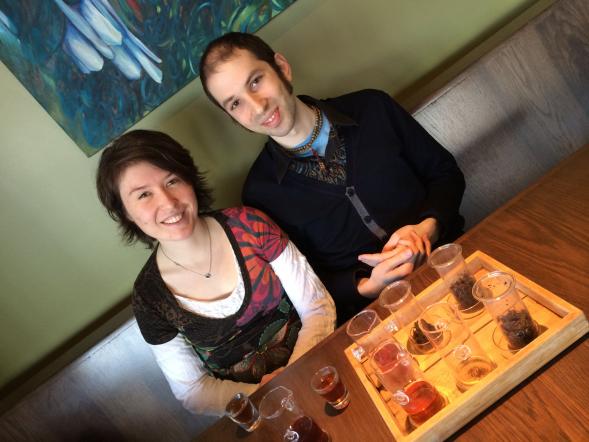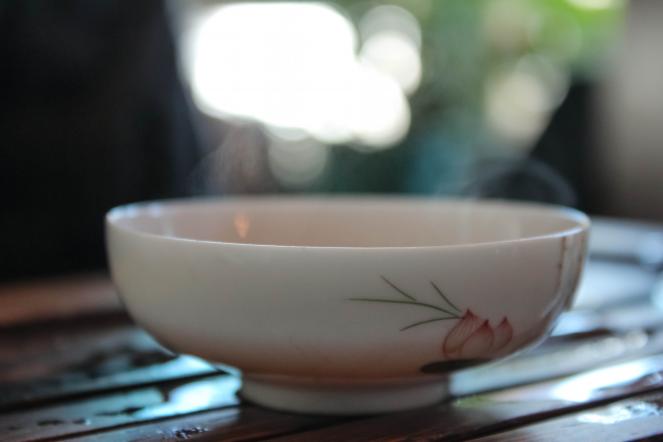Not surprisingly, the first phrase that Lily and David Duckler offer after saying hello is: "Would you like some tea?" But it's not the usual teabag thrown into a cup; for them, sharing tea with a visitor is an exercise in hospitality, cultivated half a world away.
As the owners of the charming Verdant Tea "tasting room" in the Seward neighborhood, the Ducklers often refer to the large photos lining one of the cafe's walls. Images of farmers, smiling over tea harvests, aren't just decoration — they're reminders to the Ducklers about why they're sitting here, in Minneapolis, offering a single visitor six different types of teas.
 "We're inspired by these farmers," says David, "not just because of what they grow, but because of who they are and how they act. They're the most hospitable people in the world, and that's what we wanted to bring here."
"We're inspired by these farmers," says David, "not just because of what they grow, but because of who they are and how they act. They're the most hospitable people in the world, and that's what we wanted to bring here."
After meeting in college — they managed to fall in love over philosophy discussions — the pair soon found themselves bound for China when David, who'd majored in Chinese literature, received a grant to collect the folk stories of tea farmers there.
They began to frequent the tea markets, and often had to walk home because they spent all their money on new teas. "The vendors ask you to sit down, to have a cup, and there's such a sense of calm," David recalls. "It changes your idea about tea immediately."
Most Americans have the perception that tea is fairly flavorless, he says, mostly because commercial teas are already at least six months old when they reach grocery stores, and then can sit for years after that. But fresh, real tea can be phenomenal — the aroma, the subtle nuances, the colors, can combine to tell a story of where that tea originated. Truly, the Ducklers believe, every cup is an invitation.
As they visited tea farmers, they found that every village was intensely proud of the particular type of tea they grew, and each farm boasted a kind of single-source variety that made it unique in the world. When the Ducklers proposed becoming distributors, the farmers agreed, but not for the extra money.
"They don't need our business," Lily says. "For them, it's a favor. It's an opportunity to bring real tea to people who've never had it. They're extending their hospitality by allowing us to offer this tea here."
The couple sees their business as mission driven. People are beginning to care about who grows their broccoli or raises their beef, after all, so why shouldn't they think about who's growing their tea?
They make sure that Verdant only offers about 20 to 30 teas at a time, and they bring in tea from people they trust. Much like local co-ops, Verdant specializes in teas that are in season. For example, look for many more green teas next month, since May is when that tea is fresh. Because Verdant has employees in China, the length of time between harvest and a Minneapolis teacup is only about a week.

"Our tea is fresher than what's in Beijing," David says, with a laugh. "That's how obsessed we are."
For local tea drinkers — and if you're not one already, start considering it — Verdant is certainly a respite. The cafe is now offering several Chinese comfort food options, a killer chai, and kombucha on tap.
"At the end of the day, we just want people to feel welcome," says Lily.
Visit Verdant Tea at 2111 E. Franklin Ave., Minneapolis. You can also follow them on Facebook or Twitter.
 Elizabeth Millard is the editor of Simple, Good and Tasty and has worked as a freelance journalist in the Twin Cities for 15 years. Got a lead on some favorite local products, cafe owners, or farmers? Reach her at editor@simplegoodandtasty.com
Elizabeth Millard is the editor of Simple, Good and Tasty and has worked as a freelance journalist in the Twin Cities for 15 years. Got a lead on some favorite local products, cafe owners, or farmers? Reach her at editor@simplegoodandtasty.com

